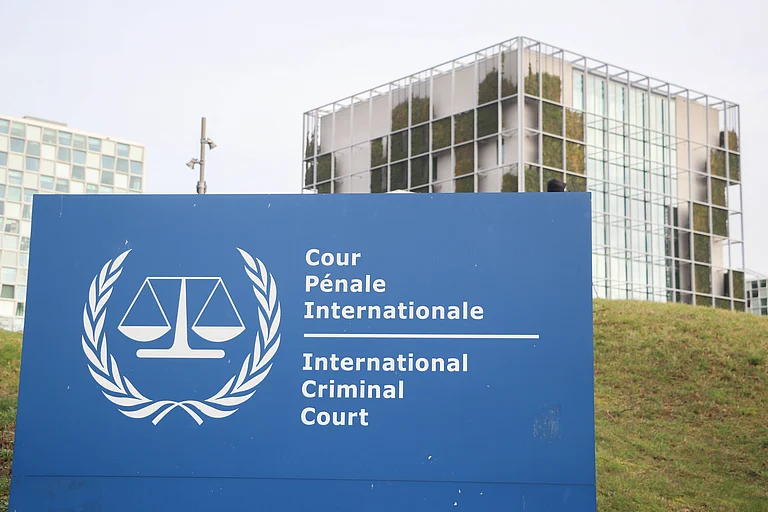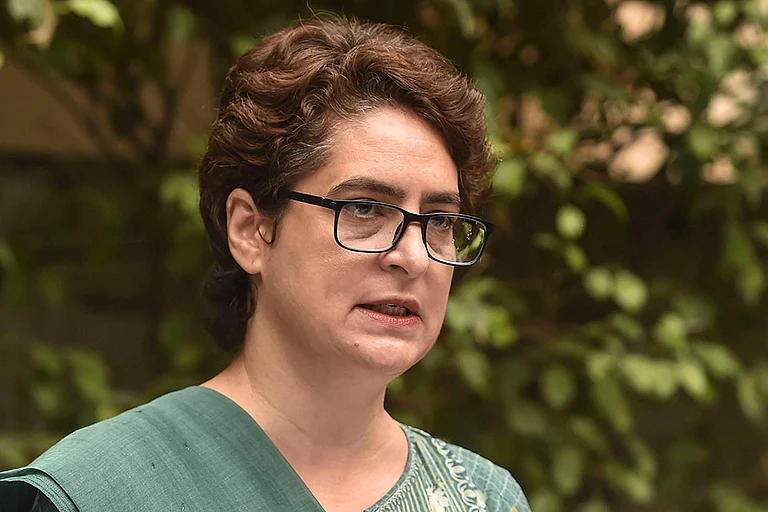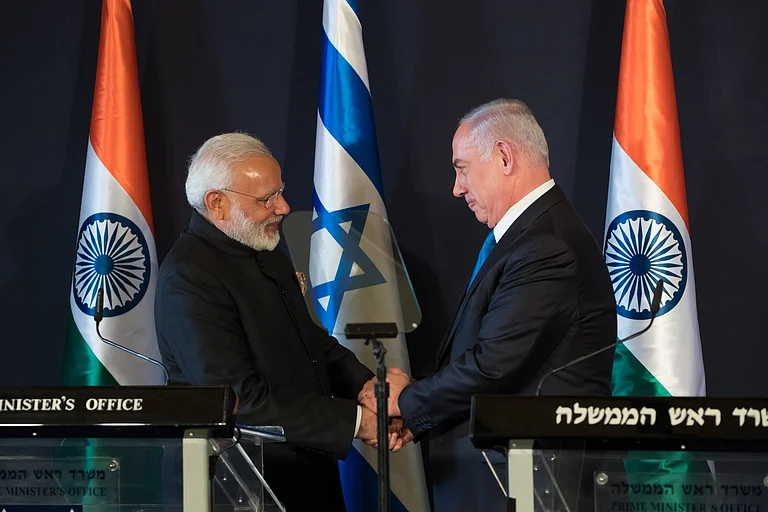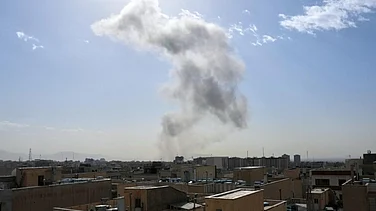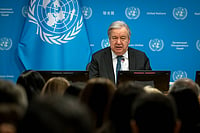
The UNSC held hostage by US veto against ceasefire resolution.
Resolution 377 (V), Section A, says if UNSC fails to safeguard international peace, UNGA shall take up the matter.
The 1950 Resolution was used for a military intervention to repel the North Korean aggression in South Korea.
Over the years, even with all its failures and flaws, criticisms and accusations of pandering to Western nations, the United Nations (UN) as an institution has managed to stay afloat, partly due to a certain sanctity that it wields. States look to be a part of the UN for international recognition and legitimacy. It remains a civil platform for nations “to discuss common problems and find shared solutions”, exchange stern words against each other for violations of international law, criticise other countries, even UN reports. There have been constant demands for reformation of the UN system, but its legitimacy and credit as an organisation having a fundamental intent to benefit humanity has rarely been questioned.
A Man-made Catastrophe
Since October 2023, Israel has set off a series of accusations against the UN and made all attempts to discredit the institution. It includes demanding the resignation of UN Secretary-General António Guterres, vowing to “teach [the] UN a lesson”, refusing visas to UN officials and calling the UN Human Rights Council (UNHRC) biased and “antisemitic”. Benjamin Netanyahu, Israel's Prime Minister, has called the UN a “house of darkness” and a “swamp of antisemitic bile”.
UN WOMEN was bluntly insulted at a sitting of the UNSC and China had to intervene, insisting that Israel use respectful language. Israel has blamed the UN for failing to distribute humanitarian aid in Gaza, while blocking all entry points to Gaza. It has called Francesca Albanese, UN Special Rapporteur on the Occupied Palestinian Territories, a “poster child for antisemitism”, leading to United States sanctions against her.
The International Criminal Court (ICC) has been accused of antisemitism too, for trying to investigate war crimes and issuing an arrest warrant against Netanyahu. The UN Relief and Works Agency (UNRWA) has been banned from operating after Israel accused UNRWA staff of involvement in “terrorist attacks”. The World Health Organization (WHO) as well as UN peacekeepers in Lebanon have been attacked by the Israeli military.
Meanwhile, the Israeli Parliament has approved the full occupation of Gaza. Israel has violated every rule laid down in the Geneva Convention as well as basic principles of international human rights law. It has bombed and destroyed non-military objects including hospitals, ambulances, universities, UN schools and refugee camps, and bakeries and desalination plants. Non-military personnel, including civilians, medics, journalists, aid workers and Palestinian Red Cross (PRC) volunteers have been fatally targeted. Decomposed babies were found in Al Nasr hospital in December 2023, after the hospital was attacked. Graves have been desecrated. In 2023, over 101 UN aid workers were killed in one month—the most casualties in a short period since the UN was formed. According to the International Federation of Journalists (IFJ), at least 190 journalists have been targeted and killed so far, including 181 Palestinian journalists and nine Lebanese journalists.
Israel has been able to completely block the entry of food, water and other humanitarian aid into Gaza and fresh orders have been given to Gazans to not enter the sea or else risk being shot dead. Palestinian Gazans have been sniped while waiting for aid in the so-called aid distribution centre run by the Gaza Humanitarian Foundation (GHF). With enforced starvation, intentional bombing and shooting against civilians every day, Gaza is a man-made catastrophe of a scale that has not been seen since the Holocaust and the siege of Stalingrad during the Second World War. Israeli bombing in Gaza now nears six times that of Hiroshima.
The faltering role of UN
When the UN was formed, a pledge was taken by the States in the UN Charter—“We the peoples of the United Nations determined to save succeeding generations from the scourge of war…” But at this point, with nothing stopping Israel, the UN has failed miserably in upholding the pledge. This brings us to the point of inequality between the UNSC and the UN General Assembly (UNGA). Five states—who were essentially the Allied powers that defeated the Axis forces during the Second World War—made themselves permanent members of the UNSC and kept with themselves the veto power. A veto by one permanent member of the UNSC prevents a Resolution from being passed.
Over the years, the veto has played the role of proxy power war. Each permanent member has used the veto unabashedly to its own advantage and to safeguard the interest of its allies. Meanwhile, each veto has also resulted in avoidable deaths miles away from the UN Headquarters in New York. In a justiciable world, that should have been enough for States to do away with the hegemony that the UNSC wields over the rest of the members of the UN. But to wrest away power from States that assert supremacy will never be easy.
Resolution 377 (V): Uniting for Peace
A UNSC Resolution will enable the UN to use the armed forces at its disposal to intervene militarily. But the UNSC, right now, is being held hostage by the US veto. In a bid to safeguard Israeli interests, the US has vetoed resolutions for a ceasefire in Gaza six times. Their insistence for veto has repeatedly been that any resolution that seeks an immediate, unconditional and permanent ceasefire would “leave Hamas in a position to carry out future attacks”. This veto has enabled and emboldened Israel to starve nearly 2 million civilians in Gaza. The UNGA that represents every member of the UN has overwhelmingly voted in favour of a ceasefire, but UNGA Resolutions are non-binding.
In 1950—in order to overcome an impasse placed by the veto of USSR for military action in South Korea to repel an attack from North Korea—the US succeeded in persuading the UNGA to take upon itself the responsibility with regard to international peace and security, resulting in Resolution 377 (V). The most important part of Resolution 377 (V) is section A, which states that where the UNSC fails to exercise its primary responsibility for the maintenance of international peace and security because of lack of unanimity of the permanent members, the UNGA shall seize itself of the matter.
According to the Resolution, the permanent members of the UNSC have a duty to exercise restraint in the use of veto. But where the UNSC fails to discharge its responsibilities, the Member States and the UN continue to have an obligation and responsibility under the UN Charter to maintain international peace and security. Failure of the UNSC does not deprive the UNGA of its rights or relieve it of its responsibilities under the UN Charter. The Resolution calls for the existence of armed forces, which could be used collectively at the recommendation by the UNGA. The UNGA may meet in an emergency special session within twenty-four hours, if requested by seven members of the UNSC (UNSC has 5 permanent members and 10 non-permanent members), or a majority of the members of the UN.
Thus, the UNGA was able to initiate military action through Resolution 377 (V) in South Korea. The tragic history attached to the Resolution is that while the action of Resolution 377 (V) was not directly responsible for the bifurcation of Korea, it did initiate military action that assisted in cementing the bifurcation along the 38th Parallel line that continues to this day.
Perhaps, it is time to undo the tragic history attached to the Resolution. It is time for the UN to initiate the Resolution and use it to save the remaining population of Gaza. The argument has been made about overreach of UNGA powers under the UN Charter since only the UNSC can call for military action. But if this argument did not stop the UNGA from acting then, it should not stop them now.
At this juncture, there is a widespread distrust of international law, and the reputation of the UN has been hit like no other times. The UN has not been able to function in any capacity in Gaza because they have been targeted militarily and discredited verbally. Even though Israel has gone on record to say that some of those attacks were “mistakes”, these “mistakes” set a precedent so diabolic that it could change the fabric of how war is fought henceforth. States can blatantly violate international humanitarian law, call it a mistake and then move on without any consequences. If the principle of quid pro quo functions in acts of diplomacy and mutual respect, constant defiance of international law will also encourage quid pro quo of violent acts in retaliation to repeated defiance. Every hospital, every school hit in the name of ‘self-defence’ is a precedent for other countries to do the same.
Every attack on the UN reduces its credibility and when a State can threaten the UN without censure, it threatens the sanctity of international law and the mechanism it upholds. Constant defiance and failure of the UN to maintain international law will lead to its breakdown. This is a threat to the principles of the UN Charter. It threatens the principle of sovereign equality of States because the precedent is set for some countries to ignore calls for restraint from other States and to be deemed over international law. This endangers smaller countries with lesser military and financial prowess, leading to the alliance of convenience based on fear and dominance. It is possible that Palestinians may have given up on international law long ago. If there is any scope for the UN to find any relevance, it needs to act and use 377 (V) A to intervene militarily.
Is all lost?
In its 79 years since the UN Charter was adopted, the UN has failed several times in preventing genocides, war crimes, forceful displacements and illegal occupations. But the UN system is also a process of translating and framing norms through self-reflection, learning and facilitating improvement of human rights practices, which must accommodate room for error, oversight and mistakes. There must also be a desire and an effort to learn from past mistakes. The process of bringing perpetrators to court via Criminal Tribunals or the ICC does not wash off the fact that crimes could have been prevented and were not prevented in the first place.
Criticism against the five permanent members for using the UNSC for their hegemony has been repetitively proven right. The failure to provide security to Palestinians in an ongoing genocide and ethnic cleansing, Israel’s constant violation of UNSC Resolutions and repeated veto by the US for a ceasefire to back Israel's continued attack on Palestinian civilians, exposes the inability of the UNSC to live up to its job. It is time to give the UNGA the respect it deserves as the true representative of equality of nations, with one vote for every country and as the genuine voice of the international community. Western countries cannot continue to use the institution to their advantage, ignoring the voices of other countries they deem inferior, and hope for peace and silence. This peace only means a calm that will break one day. An assumption of supremacy based on race, financial prowess, or military might, is the root cause of the undermining of international law and UN institutions.
A group of civilians have taken it upon themselves to break the siege and carry aid to Gaza through international waters, twice in the last two months through the Freedom Flotilla. They were intercepted by Israel both times. Citizens’ initiative is at the heart of humanity, and it should either receive the legitimacy to function and not be targeted, or States should do the work they have been mandated. Resistance, however small, is in the makeup of human beings. People can place their faith in an institution. But when institutions fail, people put their faith in each other, and it is completely wrong to hold them responsible for putting their faith in each other, when the institution responsible for upholding international law has failed so miserably.
Dr Pow Aim Hailowng has a PhD in International Law from Jawaharlal Nehru University, New Delhi and is an Assistant Professor of Law at Amity University, Kolkata.








